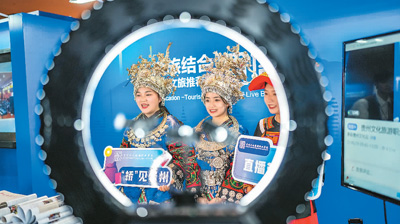Online classes provide more possibilities for international cooperation in education between China, ASEAN
In recent years, the digitalization of education has gained widespread attention. With the deep integration of cutting-edge technologies such as artificial intelligence (AI) and big data into education, new products and applications have emerged, such as 5G virtual simulation teaching, "AI plus sports" smart playgrounds, and intelligent learning diagnosis, which are frequently used in teaching scenarios.
Online classes have provided more possibilities for international cooperation in education.

Students of Guizhou Vocational College of Culture and Tourism host a livestream during the 2023 China-ASEAN Education Cooperation Week. (Xinhua/Tao Liang)
Promoting broader educational exchanges and cooperation through high-quality digital education was a hot topic for many participants during the 2023 China-ASEAN Education Cooperation Week, which was recently held in southwest China's Guizhou Province.
During the event, a live-streamed class on Chinese culture was given by a teacher from Guizhou University to students at the Confucius Institute of the Royal Academy of Cambodia.
The live-streamed class was offered on a platform called built by China Mobile Group Guizhou Co., Ltd. and jointly developed and operated by China Mobile (Chengdu) Industrial Research Institute.
As the first comprehensive smart education service platform primarily targeting ASEAN countries and countries participating in the construction of the Belt and Road Initiative (BRI), the platform focuses on the practical needs of China-ASEAN education cooperation and exchanges, and has rolled out functions such as course sharing, multi-mode and multilingual online teaching, and one-stop services.
The platform also integrates university resources and offers special courses such as textile batik and liquor tasting. Data shows that after a year of construction and development, the platform currently supports access from 11 ASEAN countries, with 62 universities being the first to join.
On Aug. 29, 2023, the China-ASEAN Digital Education Alliance was established, which is an important measure to implement the outcomes of the third China-ASEAN Education Minister Roundtable Conference. The alliance is committed to jointly promoting comprehensive, pragmatic, and inclusive high-quality education cooperation partnerships between China and ASEAN countries in the digital era.
Nearly 60 institutions from China, Malaysia, Singapore, and other countries have applied to join the alliance. The secretariat of the alliance, the "China-ASEAN Digital Education Cooperation Center," is located at the Open University of China.
Members of the alliance will conduct cooperation in strengthening research on digital education, promoting the construction and sharing of high-quality digital education resources, advancing the formulation of digital education standards, improving the infrastructure of digital education, and enhancing digital education capacity building.
Prospero E. De Vera III, Philippine Commission on Higher Education (CHED) chairman, believes that the development of high-quality digital education and the establishment of a technological network and teaching support environment can create opportunities for collaboration under BRI.
"By establishing the China-ASEAN Digital Education Alliance, we hope that learners from China and ASEAN countries can access high-quality educational resources and lifelong learning opportunities at lower costs and with more flexibility. This will contribute to the transformation of education digitization and the innovation of digital education paradigms," said Wang Qiming, President of the Open University of China.
The advent of digital technology has significantly expanded the possibilities for vocational education. The integration of virtual reality (VR) and augmented reality (AR) technologies into 5G virtual simulation training platforms has transformed classrooms into interactive and immersive learning environments.
In July 2023, China's Ministry of Education issued a notice to expedite the reform and development of the modern vocational education system. The notice emphasized the need to establish virtual simulation training bases for vocational education and make effective use of new-generation information technologies like VR and digital twins.
Photos
Related Stories
- China tops list of influential academic papers
- The League of Tropical Universities Blazes a Trail in Tackling Tropical Challenges
- Seminar urges rethink on academic focus
- New regulation turns focus to off-campus training bodies
- China issues action plan to improve basic education
- Law to stop jump-start at preschool
- China mulls law to ensure accessible, quality preschool education
- Pic story: rural children enjoy art education in C China's Hunan
Copyright © 2023 People's Daily Online. All Rights Reserved.









